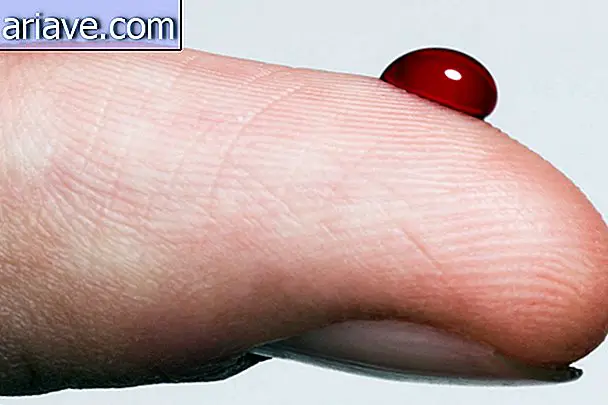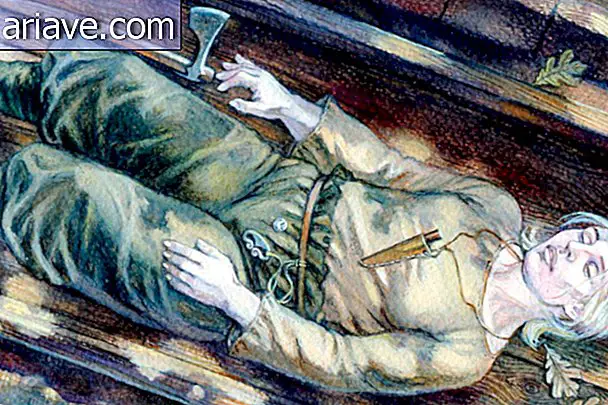Amazing! 6 extremely human behaviors identified in animals
Who has never seen an animal that looks like people ?! Well, maybe those situations where we see animals behaving in a human-like way reveal that there are much more similarities than differences between humans and animals.
These are attitudes that make us rethink the ability of these pets and their instinct to protect or influence their peers. Check out this list created by Cracked with some behaviors found among dogs, cats, birds and even insects that will remember our reality a lot.
# 1 - Field Rats Don't Be Left Behind Alcohol

How many times have you not gone out with your most drunk friend and swore to yourself that you wouldn't be behind him in the number of shots? Be aware that the field mice, which are common animals in North America, behave quite similarly to what you and your friend have at the bar.
They are hairy and may look cuddly, but the researchers concluded that there is a competing instinct that surges among rats when it comes to alcohol. Bad news for the wives of mice, but this is excellent news for researchers devoted to the study of social alcohol consumption and interpersonal relationships.
For this reason, an experiment was conducted between Oregon Health & Science University and the Portland Veterans Affairs Medical Center, both in the United States, to better understand animal behavior. Several field mice were placed in a cage equipped with water and a 6% alcoholic beverage. It was observed that when alone the rats drank equal amounts of water and alcohol. However, when rodents were accompanied by one of their peers, they preferred alcohol 80% of the time.
The researchers noted that some pairs drank more and others less, but in either case the mice sought to consume the same amount of alcohol as the animal that kept them in the cage.
To see if this was just a coincidence, the scientists conducted a new experiment in which rats had water and sugary water at their disposal, which is their favorite drink. Surprisingly, although they actually preferred sugary water over water, their behavior changed completely and they began to consume more sugary water simply to not let their mate do the same.
# 2 - Cats Share Their Space to Avoid Conflict

We know that some humans do not deal very well with situations where they are forced to share their space. But we also know that having waist play is important to avoid misunderstandings. And that, even cats understand.
An experiment by the BBC and the Royal Veterinary College has shown that cats are able to share or even give up their space to avoid conflict. The study was conducted on the outskirts of London, England, where trackers and cameras specifically designed to capture cat movements were installed in 50 domestic animals to record their interaction with other felines.
The findings showed that even when an animal clearly assumes ownership of a given space, it allows other cats to momentarily occupy its territory. Beginners use the newly acquired space to hunt or just rest, but they know they will eventually need to leave for the owner or another animal to reoccupy that location.
But don't think that cats are always warm animals. The researchers noted that it is not any feline that can occupy the space of another cat. If the animals are even rivals, there is a great risk of the novice being chased rather than welcomed. On the other hand, once the animal has been accepted into space that already belongs to a cat, this is a good sign.
# 3 - Birds protect their nests with passwords

Or did you think that passwords only served to control access to mailboxes, bank accounts and your smartphone ?! In addition to protecting your personal information from potential intruders, Malurus cyaneus birds are known in the wild to use a password to prevent other birds from invading their nest.
A study published in the journal Current Biology found that mothers of the species traditionally found in Australia begin to sing to their eggs a week before they hatch. The song she chooses becomes a password, and after the chicks hatch, they have to play the same song in order to be fed. If they miss the code, the mother leaves the nest and lets the birds die.
It has been noted that this behavior is common in the species because the cuckoos of the region usually lay their eggs in the malurus' nests in the hope that the mothers will raise the young as their own. The problem is that in addition to consuming much of the food the mother brings, the cuckoos have a bad habit of pushing the malurus out of the nest.
The scientists concluded that the species has developed this voice recognition system to differentiate its pups from potential invaders, even though the cuckoos are gray and look very different from the malurus pups. Not surprisingly, the cuckoos even try to reproduce their stepmother's song, but are unsuccessful in getting food.
During the study, the researchers noticed that the password changes from nest to nest and were able to recognize 19 different melodic elements that are used by malurus females to create a unique song. This means that if you are one who uses the password “123456” for all your internet accounts, a bird may be more efficient than you at creating a secret code.
# 4 - Dogs let females win

Have you ever let your younger cousin win the game just so the game could last longer? So be aware that recent research has shown that male dogs behave very similarly to females.
The study showed that dogs treat females differently when they are fighting, for example, leaving more sensitive parts of their bodies exposed - such as the neck or muzzle - as reaching these areas means scoring more points in the game. It is also common to note in some breeds that even though they have a stronger physical structure, males often fall more often to the ground to favor their mates.
Researcher Camille Ward at the University of Michigan says puppies allow themselves to be lost to make the play last longer or result in some kind of romance. The behavior catches scientists' attention because the most common attitude in nature is for a male to behave as dominant to be able to breed with as many females as possible, but it seems that some dog breeds simply do not follow this rule.
# 5 - Pigeons like to bet

If we consider that gambling is a human activity that involves the whole process of betting a considerable amount of money on something that brings almost no certainty of return, leaving the gambler increasingly lost, how to imagine that this kind of behavior could be identified in pigeons?
Psychologist Thomas Zentall of the University of Kentucky recruited a few smart birds and decided to test their behavior against a system of trial and reward to see if living things really have a tendency to risk large sums in exchange for some. small and sporadic returns.
The pigeons were properly trained so that they could understand how the experiment would work. After this process, each bird was placed before lights that should be pecked in exchange for food. The scheme worked as follows: a light placed to the right of the bird flashed in two different colors (blue and yellow, for example), but either one rewarded the bird with 3 grains of feed every time it was pecked, while the light at The left flashed green and red, with green appearing 80% of the time, but not rewarding the pigeon with anything and red, which appeared only 20% of the time, resulted in 10 grains of feed.
The system is a bit confusing, but indicates that if the pigeon tended to be a gambler, even though he had an option that would always give him rewards, he would prefer to try the green / red light, though not knowing which color would light up and receive food. in exchange for your choice. Statistically speaking, birds that acted less impulsively would receive more food than bettors.
Interestingly, the researcher can observe that birds preferred to bet most of the time (82%). Thomas Zentall believes this behavior happens because the expectation of getting a large amount of food is rewarding. The scientist even drew a parallel with people who spend days in front of the betting machines without eating or going to the bathroom.
However, as with human bets, it has been recognized that the gambler loses interest when expectation decreases. By making both green and red light reward 10 grains of feed 20% of the time, the pigeons had a safer attitude, preferring to peck at the lights that always resulted in 3 grains of feed.
# 6 - Termites Promote Election Campaigns

You will be surprised to see that insects also become more sociable and even offer “gifts” to their peers for the sole purpose of reaching the highest rank in their colony. What termites of the Cryptotermes secundus species can easily be compared to an election campaign.
The New Scientist report points out that the first phase of the election of the new command begins with the division of the colony into small groups of 50 to 100 insects, as all working termites can become king or queen when the last insect loses its position. However, when this time comes, only 12% of the insects undergo the physical transformation necessary to be able to take the throne. In the next step, opponents start fighting and those who are weaker or wounded are devoured by the other termites.
Suddenly, the surviving candidates become more sociable insects and start spending more time fraternizing with the rest of the colony. Contacting workers' termites antennae with workers is a fairly common gesture, and it is impossible not to relate this behavior to politicians who take to the streets to greet their voters. Occasionally campaign termites also feed working termites, as their feces are one of the energy sources of this insect species.
Although there are many similarities to the way we organize ourselves, the process of electing the termite king and queen usually takes up to 11 days, while elections here extend for months.











